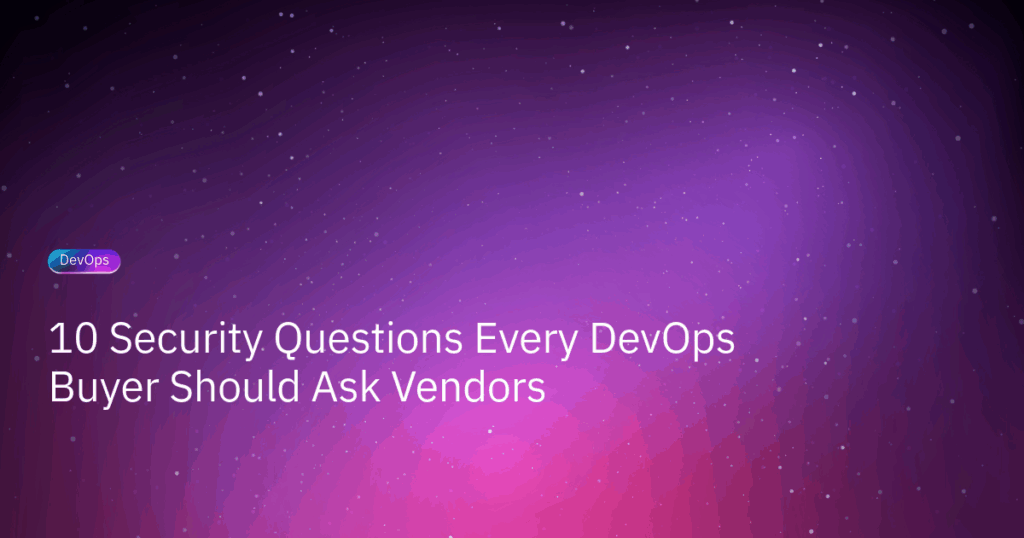
When choosing a DevOps platform, most non-engineering executives focus on performance, scalability, and cost. But there’s a quieter threat lurking beneath the surface of every demo call: security.
Security isn’t just a technical concern—it’s a business risk. A single misstep in how a vendor handles secrets, authentication, or infrastructure permissions can cascade into regulatory headaches, financial exposure, or brand damage. In an era where data breaches are board-level crises, asking the right security questions upfront is no longer optional.
This post is your guide to the critical security questions that non-technical buyers—like product leaders, founders, and operations heads—should be asking DevOps vendors. We’ll unpack why these questions matter, how to interpret the answers, and how platforms like Revolte build trust through transparent, security-first design.
1. How is customer data secured at rest and in transit?
This is the baseline. Any vendor that can’t immediately explain their data encryption practices—TLS in transit, AES-256 at rest—isn’t ready for prime time. But go deeper: are encryption keys customer-managed or vendor-managed? Is disk-level encryption backed by a KMS (Key Management Service)?
Look for evidence of encryption policies that go beyond box-ticking. Best-in-class platforms allow you to bring your own keys (BYOK) or support customer-specific isolation for highly sensitive workloads.
2. What is your approach to secrets management?
DevOps platforms routinely interact with sensitive credentials—API tokens, database passwords, SSH keys. If a vendor’s answer involves storing secrets in environment variables or plain-text config files, that’s a red flag.
You want hardened, auditable, and centralized secrets management—ideally via integrations with systems like HashiCorp Vault, AWS Secrets Manager, or custom-built solutions with role-based access and encryption at rest.
3. How is identity and access management (IAM) enforced across the platform?
Who can access what, and how easily can those permissions be abused? Ask how the vendor enforces principle of least privilege (PoLP), both internally and for customer accounts.
Look for support for SSO (SAML, OIDC), granular role-based access control (RBAC), and audit trails that show who accessed what, when. Without these controls, it’s impossible to scale securely across teams.
4. How do you handle third-party dependencies and supply chain risk?
Modern platforms sit atop dozens—sometimes hundreds—of open-source components and cloud services. Ask how the vendor monitors vulnerabilities in these dependencies. Do they have a Software Bill of Materials (SBOM)? Are dependencies continuously scanned and patched?
The SolarWinds breach showed how attackers can poison the well upstream. A responsible vendor should be able to show you how they reduce that blast radius.
5. What security certifications and audits do you undergo?
SOC 2 Type II, ISO 27001, HIPAA, GDPR—these aren’t just logos. They’re signals of maturity. But don’t stop at the acronym. Ask for the latest audit date, scope, and whether reports can be shared under NDA.
More importantly, ask how these frameworks shape their actual development and operations. A vendor doing compliance theater will dodge those questions. A good one will show how security is embedded in their SDLC.
6. What happens when a breach occurs?
No system is invulnerable. What matters is how vendors respond. Ask about their incident response (IR) policies. Is there a documented IR playbook? How quickly will they notify you of an incident? Who is responsible for what during containment and recovery?
Great vendors run tabletop exercises, have 24/7 on-call security engineers, and integrate IR with their observability stack.
7. Can I get a data residency or data sovereignty guarantee?
For companies in regulated industries or global markets, knowing where your data lives is non-negotiable. Can the vendor isolate workloads to specific regions? Are backups replicated across borders?
Cloud-native doesn’t have to mean borderless. The best vendors support regional deployment options or sovereign cloud setups.
8. How are customer environments isolated?
Multi-tenancy is efficient—but it’s also a vector for risk. Ask whether workloads run in shared environments or are isolated via containers, VMs, or even dedicated clusters. What controls prevent cross-tenant access?
Look for answers that involve namespace isolation, tenant-aware access controls, and strong logical boundaries.
9. How do you ensure secure CI/CD pipelines?
The CI/CD pipeline is often the weakest link. Ask if build steps are sandboxed. Are artifacts scanned for vulnerabilities? Can the vendor prevent unauthorized code from being promoted to production?
Vendors should talk about provenance, signed builds, and hardened runners. Anything less invites tampering.
10. What is your approach to ongoing vulnerability management?
Security isn’t static. Vendors need real-time monitoring, continuous patching, and proactive threat modeling. Ask about how often they scan their systems, how fast they patch known CVEs, and whether they engage in bug bounty programs.
If they treat security as a project, not a program, walk away.
How Revolte Builds Security into the Core
Revolte was built with security as a design principle, not a feature layer. Our platform:
- Encrypts all data using customer-isolated KMS keys
- Integrates native secrets management with RBAC
- Supports enterprise SSO and audit logging by default
- Offers workload isolation per tenant with hardened containers
- Runs daily vulnerability scans and has a 24/7 security response team
Our philosophy: security should never be a blocker, but it must always be a foundation. That’s how we help fast-scaling teams move fast without breaking trust.
Final Thoughts: Security Is a Buying Signal
Asking tough security questions doesn’t just protect your organization—it shows vendors that you’re serious. That pressure drives better products. The more you treat security as a first-class decision criterion, the more the ecosystem matures.
Revolte is here for the teams that won’t compromise on velocity or security. If you’re evaluating DevOps platforms and want to see what secure-by-default looks like in practice, we’d love to show you.
Ready to evaluate a platform built for trust and speed?